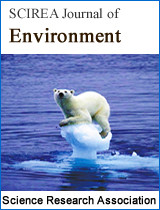Kanchan arsenic filters in Nepal: Constraints concerning removal efficiency
DOI: 10.54647/environmental61284 98 Downloads 94366 Views
Author(s)
Abstract
Unrequested health effects of a long-term intake of arsenic contaminated ground water have been known since a long time in Nepal and other countries in South-East Asia. Nowadays, so called Kanchan filters are installed in the lowland of Nepal but their removal efficiency has hardly ever been evaluated. This mini review reports about the constraints determined to influence the removal efficiency: Besides geological (mineralogy of the sediments), geochemical (pH, redox conditions, temperature, and solution composition) and handling (e.g. drying of the nail bed) issues, the maintenance of the filters by the involved residents is a major and underestimated concern.
Keywords
Arsenic, iron, decoupling, clay minerals, Kanchan filter, removal
Cite this paper
BARBARA MUELLER,
Kanchan arsenic filters in Nepal: Constraints concerning removal efficiency
, SCIREA Journal of Environment.
Volume 6, Issue 2, April 2022 | PP. 15-19.
10.54647/environmental61284
References
| [ 1 ] | Sharma, R. M. 1999. Research study on possible contamination of groundwater with arsenic in Jhapa, Morang, and Sunsari districts of Eastern Terai of Nepal. Report of WHO Project, DWSS Government of Nepal. |
| [ 2 ] | Nakano, A., Kurosawa, K., Shamim, U. M., Tani, M. 2014. Geochemical assessment of arsenic contamination in well water and sediments from several communities in the Nawalparasi District of Nepal. Environ Earth Sci, 72, 3269-3280. |
| [ 3 ] | Ngai, T. K. K., Shrestha, R. R., Dangol, B,. Maharjan, M., Murcott, S. E. 2007. Design for sustainable development – Household drinking water filter for arsenic and pathogen treatment in Nepal. J Environ Sci Health – A Tox Hazard Subst Environ Eng, 42, 1879-1888. |
| [ 4 ] | Mueller, B. 2017. Arsenic in groundwater in the southern lowlands of Nepal and its mitigation options: A review. Environ Rev, 25, 296-305. |
| [ 5 ] | Mueller, B., Hug, S. J. 2018. Climatic variations and de-coupling between arsenic and iron in arsenic contaminated ground water in the lowlands of Nepal. Chemosphere, 210, 347-358. |
| [ 6 ] | Mueller, B. 2019. Ground water contamination by arsenic in Nepal: Lessons to be learned from geology. Austin Chem Eng, 6, 1064-1069. |
| [ 7 ] | Mueller, B. 2020. First results of improved arsenic removal by redesigned Kanchan filters in the lowlands of Nepal. J Chem Appl, 2, 1-9. |
| [ 8 ] | Mueller, B., Dangol, B., Ngai, T. K. K., Hug, S. J. 2020. Kanchan arsenic filters in the lowlands of Nepal – mode of operation, arsenic removal and future improvements. Submitted to. Environmental Geochemistry and Health, https://doi.org/10.1007/s10653-020-00718-9. |
| [ 9 ] | Nickson, R. T., McArthur, J. M., Ravenscroft, P., Burgess, W. G., Ahmed, K. M. 2000. Mechanism of arsenic release to groundwater, Bangladesh and West Bengal. Appl Geochem, 15, 403-413. |
| [ 10 ] | Guillot, S., Garçon, M., Weinman, .B, Gajurel, A,. Tisserand, D., France-Lanord, C., van Geen, A., Chakraborty, S., Huyghe, P., Upreti, B. N., Charlet, L. 2015. Origin of arsenic in Late Pleistocene to Holocene sediments in the Nawalparasi district (Terai, Nepal). Environm Earth Sci, DOI 10.1007/s12665-015-4277-y. |
| [ 11 ] | Zweifel, E. R. Arsenic contamination in Nepal: Water treatment issues and geologic origin of the pollution. Master Thesis, Institute of Geography, University of Bern, 2018, 67 pp. |

